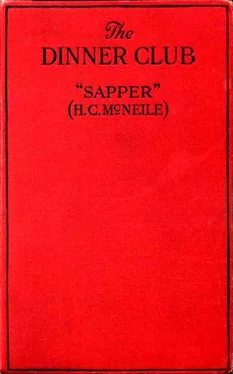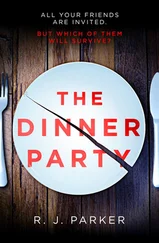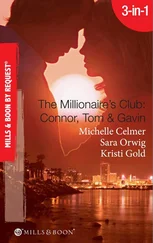“ ‘I suppose you think that I hardly look as if I could afford such luxuries,’ she smiled faintly. ‘I’ve only seen it from the gallery and pit, you know. And even that has meant that I’ve had to go without lunch. But—you see—it was necessary for me to see it: I had to. It was part of my plan—a necessary part.’
“ ‘I don’t want to seem dense,’ I said gently, ‘but I’m afraid I don’t quite follow. How can seeing my play thirty odd times be a necessary part of your plan?’
“ ‘That’s what I don’t want to tell you now,’ she repeated, and once more her hands began twisting nervously. ‘I want to wait till afterwards, when perhaps you’ll—of your kindness—do as I ask you. Oh! Mr. Trayne—for God’s sake, don’t fail me!’ She leant forward beseechingly in her chair.
“ ‘My dear child,’ I answered quietly—I don’t think she can have been much more than twenty, ‘you haven’t told me yet what you want me to do.’
“ ‘I want you to come to a house in Kensington with me,’ she said steadily.”
Once again the Actor paused, and stared at the fire. Then he gave a short laugh.
“When she said that, I looked at her pretty sharply. Without appearing conceited or anything of that sort, one has occasionally in the course of one’s career, received certain flattering attentions from charming women—attentions which—er—one is tempted to conceal from one’s wife.”
“Precisely,” murmured the Ordinary Man. “Precisely.”
“And for a moment, I must confess that the thought passed through my mind that this was one of those occasions. And it wasn’t until the colour rose to her face and stained it scarlet, that I realised that not only had I made a mistake, but that I had been foolish enough to let her see that I had.
“ ‘My God!’ she whispered, ‘you don’t think—you couldn’t think—that I meant . . .’
“She rose and almost cowered away from me. ‘Why, I’m married.’
“I refrained from remarking that the fact was hardly such a conclusive proof of the absurdity of my unspoken thought as she seemed to imagine. I merely bowed, and said a little formally: ‘Please don’t jump to conclusions. May I ask why you wish me to come to a house in Kensington with you?’
“The colour ebbed away from her cheeks, and she sat down again.
“ ‘That’s the very thing I don’t want to tell you, until you come,’ she answered very low. ‘I know it sounds absurd—it must do, it seems as if I were being unnecessarily mysterious. But I can’t tell you, Mr. Trayne, I can’t tell you . . . Not yet. . . .’
“And then the call boy knocked, and I had to go on for the last act. In a way I suppose it was absurd of me—but life is made up of impulses. I confess that the whole thing intrigued me. When a woman comes and tells you that she has seen your play every night since it started; that she’s had to go without her lunch to do so; that it was a necessary part of some wonderful plan, and that she wants you to go to a house in Kensington, the least curious man would be attracted. And from my earliest infancy I’ve always been engrossed in other people’s business.
“ ‘All right,’ I said briefly. ‘I’ll come with you.’
“And then I had to put out my hand to steady her, I thought she was going to faint. Reaction, I thought at the time; later, it struck me that the reason was much more prosaic—lack of food.
“I stopped for a moment till she seemed herself again; then I told her to wait outside.
“ ‘I shall be about half an hour,’ I said, ‘and then we’ll take a taxi, and go down to Kensington. Tell them to give you a chair. . . .’
“And my last impression as I went on to the stage was of a white-faced girl clutching the table, staring at me with great brown eyes that held in them a dawning triumph.
“I think,” went on the Actor thoughtfully, “that that is where the tragedy of it all really lay. Afterwards she told me that the part of her plan which had seemed most difficult to her was getting my consent to go with her to Kensington. Once that was done, she knew all would be well, she was absolutely and supremely confident. And when I went on to the stage for the fourth act, she felt that success had crowned her efforts, that what was to come after was nothing compared to that which she had already done. The inaccessible stronghold had been stormed, the ogre had proved to be a lamb.
“Well, we went to Kensington. I sent my own car home, and we took a taxi. During the drive she was very silent, and I didn’t try to make her talk. Evidently no inkling of the mysterious plan was to be revealed until we arrived at the address she had given the driver. It was some obscure street that I had never heard of and the name of which I have completely forgotten. I know it was somewhere not far from Barker’s.
“The door was opened by a repulsive-looking woman who peered at me suspiciously. And then the girl took her on one side and whispered something in her ear. Apparently it had the desired effect, as the Gorgon retired grumbling to an odoriferous basement, leaving us alone in the hall.
“When she had shut the door the girl turned to me.
“ ‘Will you come upstairs, Mr. Trayne. I want you to meet my husband.’
“I bowed. ‘Certainly,’ I said, and she led the way.
“ ‘So the husband was in the plan,’ I reflected as I followed her. Was he a genius with a play that he proposed to read to me? I had suffered from the plays of genius before. Or was he some actor down on his luck? If so, why all the mystery? And then, when I’d made up my mind that it was a mere begging case, we arrived at the room. Just before she turned the handle of the door she again looked at me.
“ ‘My husband is ill, Mr. Trayne. You’ll excuse his being in bed.’
“Then we went in. Good Lord! you fellows,” the Actor leant forward in his chair. “I’ve been pretty hard up in the old days, but as I stood inside that door I realised for the first time what poverty—real poverty—meant. Mark you, the girl was a lady; the weak, cadaverous-looking fellow propped up in bed with a tattered shawl round his shoulders was a gentleman. And beyond the bed, and one chair, and a rackety old chest-of-drawers there wasn’t a stick of furniture in the room. There was a curtain in the corner with what looked like a washstand behind it, and a shelf by the bed with two cups and some plates on it. And nothing else except an appalling oleograph of Queen Victoria on the wall.
“ ‘This is Mr. Trayne, dear.’ She was bending over her husband, and after a moment he looked up at me.
“ ‘It was good of you to come, sir,’ he said. ‘Very good.’ And then he turned to his wife and I heard him say: ‘Have you told him yet, Kitty?’
“She shook her head. ‘Not yet, darling, I will now.’ She left his side and came over to me.
“ ‘Mr. Trayne, I know you thought me very peculiar at the theatre. But I was afraid that if I told you what I really wanted you’d have refused to come. You get hundreds and hundreds of people coming to see you who think they can act. Asking you to help them get a job and that sort of thing. Well, I was afraid that if I told you that that was what I wanted, you’d have told me to go away. Perhaps you’d have given me a straw of comfort—taken my address—said you’d let me know if anything turned up. But nothing would have turned up. . . . And, you see, I was rather desperate.’
“The big brown eyes were fixed on me pleadingly, and somehow I didn’t feel quite as annoyed as I should have done at what was nothing more nor less than a blatant trick to appeal to my sympathy.
“ ‘Perhaps nothing would have turned up,’ I said gently, ‘but you must remember that to-day the stage is a hopelessly overstocked profession. There are hundreds of trained actors and actresses unable to obtain a job.’
Читать дальше












